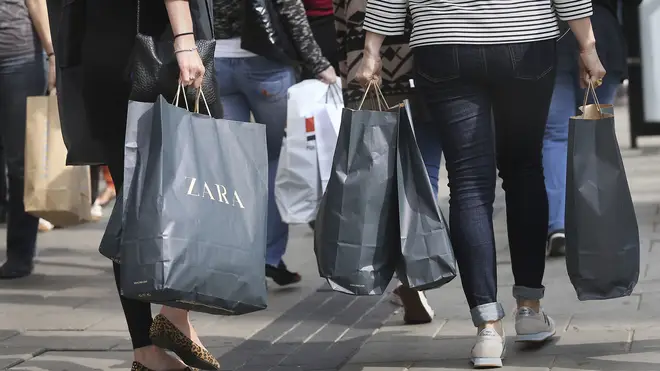
Natasha Devon 6pm - 9pm
1 September 2020, 22:01 | Updated: 2 September 2020, 08:23

Retail expert predicts further tragedies for the high street
Britain has just 100 days to save our high streets as retailers reach the tipping point of the coronavirus crisis.
With the pandemic forcing a major shutdown of shopping centres, thousands of jobs have been lost and many more could be at risk.
Catherine Shuttleworth, CEO of retail consultancy Savvy, told LBC's Nick Ferrari on Wednesday that the time to save significant job losses on the high streets has sadly passed.
Read more: 'More wretched Covid to come, but UK is getting back on its feet', says Boris Johnson
Read more: Finally! Back to school and work
She added many previously viable businesses are now at a tipping point, and face a crucial twelve-week period leading up to Christmas - for many, this will be make-or-break - and significant interventions are needed to prevent a mass of liquidations and job losses.
"We are going into the golden quarter for retail, the run up the Christmas, but I think we are going to see more casualties and more job losses because the reality it, people are not going into physical stores anymore," she said.
"Retailers have got to do everything they can, but it is challenging at a time when the the Prime Minister is saying there is more of this 'wretched' Covid to come.
"No one can be sure they will be safe at the shops or on public transport and until that changes retailers are in a very difficult place."
She also suggested the possibility of a government voucher scheme, similar to Eat out to Help Out, to encourage peopel to shop on the high street.

Footfall across all shopping destinations was up six per cent last week, with a 9.1 per cent rise in shopping centres, in part due to the poor weather.
But overall, footfall is still a quarter down on this time last year.
The latest Business Impact of Coronavirus Survey found 48 per cent of applicable trading businesses have seen decreased footfall compared to what is normally expected for this time of year.
Springboard Insights Director, Diane Wehrle, said although footfall has decreased a lot on last year, last week’s increases are a better result than had been seen so far in lockdown and are a “glimmer of hope” for retailers.
She also said the Government’s Eat Out to Help Out scheme, Ms Wehrle said it “has proved successful” and said it has “drawn people back into our retail destinations.”
She told LBC News’ Jim Diamond: “For the week up to Saturday, footfall actually rose by six per cent from the week before, which was a good uplift.
“In shopping centres, footfall rose by 9.1 per cent, and part of that will have been down to the rainy, cold weather, which drove people inside shopping malls and seeking covered environments, so that was really good.

Federation of Small Businesses chief on Eat Out to Help Out
“Actually, at the end of the week on Saturday, footfall was sitting at 26 per cent down on last year, which sounds a lot, and it is, but it’s a better result than we’ve had since the start of the lockdown, so that is actually a glimmer of hope for retail destinations and stores within them.”
She added: “We all know that before Covid, bricks and mortar retail and retail destinations were fuelled by our ability to go and have an experience, to go and have coffee and lunch and dinner at these places, it wasn’t just about buying stuff.
“Actually, we realised very quickly that unless you offer this diversity of experience, people aren’t just willing to go and buy stuff, particularly at the moment because the shopping experience isn’t perhaps as good as it once was, because we have to wear masks and social distance.
“So anything that can draw people back into retail destinations is great, and it has really worked, so that’s been really positive.”
But she said big cities, which have been compared to ghost towns, are still “really struggling.”
She said: “Footfall at the end of the week in regional cities, that’s our major cities across the UK, was 43 per cent down on last year, and you compare that to all destinations, which sat at 26 per cent down, so much worse.
Listen & subscribe: Global Player | Apple Podcasts | Google Podcasts | Spotify
"In central London it was 55 per cent down, but the good point is that footfall actually rose last week from the week before by nearly eight per cent in regional cities and seven per cent in central London, so things are shifting upwards, it just takes a lot more.
“In central London there are international tourists, and we’re missing those, in addition to those who work in central London, so it’s got a double-whammy hit in central London.”
Speaking to LBC’s Maajid Nawaz, Lord Karan Bilimoria, President of the Confederation of British Industry and founder of Cobra Beer, said the UK is “behind the curve in getting back to work.”
He said: "We've had to put health first over the past five and a half months but it's caused a huge economic crisis.
"We've been flattening the health curve, now what we're really worried about is unemployment, we've got to flatten the unemployment curve."
Lord Bilimoria added: "What we've got to do is have a balanced approach.
"If you look at international comparisons, the latest statistics are of white collar workers going back to work...we're at 34 per cent, France is over 80 per cent, Italy is almost at 80 per cent, Germany is at 70 per cent and the Europe-wide average is around 70 per cent."
"We are well behind the curve in getting back to work. We've got to encourage people, they've got to feel confident and safe to return to work."